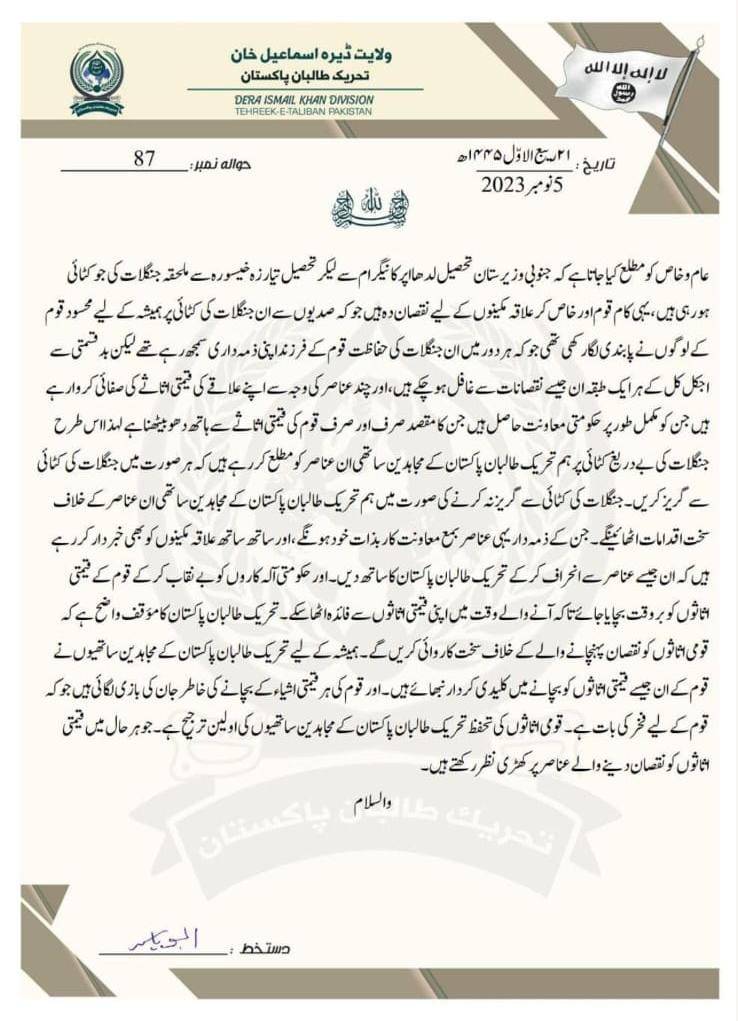
The Tehreek-i-Taliban Pakistan (TTP) is undergoing a transformation by adopting a Pashtun Nationalist identity. In this vein, they have recently issued a statement, cautioning the timber mafia against the unauthorized felling of trees in the Mehsud region of South Waziristan. This development deserves significant consideration, as it sends a stark message to the power centers in Pakistan regarding the future of the Ex-Federally Administered Tribal Areas (Ex-FATA), as well as the broader Pashtun population on both sides of the border.
The language employed in the statement carries distinct nationalist undertones and revolves around the ownership of assets held by the Mehsud tribe. It explicitly states, "It is imperative for all to comprehend that the felling of trees within the precincts of Tehsil Ladha and Tehsil Tyarza Khesora has adverse consequences for the Mehsud tribe, as these trees have remained protected by the Mehsud elders for centuries." Furthermore, the statement conveys that the Mehsud tribe has taken it upon itself to safeguard these invaluable trees. Regrettably, certain elements, with the complicity of government officials, seem to have disregarded their responsibilities, thereby causing harm to their own people and their assets.
The letter goes on to issue a stern warning to the timber mafia, cautioning them of grave repercussions should they persist in tree felling. It also calls upon the local populace to rally behind the TTP in countering these elements, thereby ensuring the protection of their valuable assets, which will ultimately benefit future generations. The letter underscores the unequivocal stance of the TTP, asserting, "Our position is crystal clear: anyone jeopardizing the national assets of the tribal people will face action, just as we have consistently taken action whenever our national assets have been threatened in the past." It emphatically states that safeguarding these national assets ranks as the utmost priority for the TTP Mujahideen.
The escalating internal discord among various ethnic groups poses a significant threat to Pakistan, as it inadvertently fuels the rise of militant outfits by providing them with fertile ground and garnering public support.
This singular letter is poised to compel the timber mafia to halt their tree-felling activities, while simultaneously delivering a resounding message to the people. It underscores that it was, in fact, the TTP that stepped in to protect their natural resources, as opposed to the government. It's indeed lamentable that the responsibility of safeguarding the natural resources of the tribal population, which ideally falls under the purview of government officials, has now seen the TTP assuming this crucial role.

Amid the governance void in the Ex-FATA region and the emergence of the Afghan Taliban government, the Tehreek-i-Taliban Pakistan (TTP) has undergone a significant transformation. It has shifted its stance from that of a mere saboteur to a perceived nationalist entity, now garnering support from the tribal population, particularly the youth. This evolving support can be attributed to a growing sentiment among the younger generation, who increasingly feel that their region's resources are being exploited and they receive little, if anything, in return.
The government's poorly conceived plans are inadvertently facilitating the activities of militant groups such as the TTP. It is worth noting that Lashkar-e-Islam, a previously dismantled terrorist organization, has reemerged in the Khyber district of Khyber Pakhtunkhwa (KP). This resurgence resulted in a fatal attack on a military convoy, claiming the life of an officer and three soldiers.
As previously pointed out, the abrupt and forceful deportation of Afghan refugees was always bound to be a complex undertaking. In a recent development, Haji Ghous Ullah, a member of the Chamber of Commerce and a Pashtun Nationalist, addressed a large gathering in Chaman, Baluchistan. He issued a warning that, starting from November 9th of this month, identity card verifications would be enforced, potentially leading to the expulsion of Sindhis and Punjabis from Baluchistan. Furthermore, there are reports that Pashtuns and Afghans are currently facing harassment and intimidation in these provinces under the pretext of deporting Afghan refugees. The escalating internal discord among various ethnic groups poses a significant threat to Pakistan, as it inadvertently fuels the rise of militant outfits by providing them with fertile ground and garnering public support.
Any fragmentation of PTI would likely exacerbate feelings of alienation among the youth, potentially intensifying their support for entities like PTM and the TTP. It's imperative to recognize the role political entities play in shaping the political and ideological landscape of the region, and disbanding them can have far-reaching consequences.
I have consistently emphasized in my articles the importance of not undermining political parties with broad national appeal, such as the Pakistan Tehrik-e-Insaf (PTI), which wields significant influence in Khyber Pakhtunkhwa (KP). The weakening of such parties might inadvertently drive the youth toward alternative groups like the Pashtun Tahaffuz Movement (PTM) and the Tehreek-e-Taliban Pakistan (TTP). PTI has played a pivotal role as a unifying force among the Pashtun youth, actively bridging generational divides and fostering a sense of inclusion.
Any fragmentation of PTI would likely exacerbate feelings of alienation among the youth, potentially intensifying their support for entities like PTM and the TTP. It's imperative to recognize the role political entities play in shaping the political and ideological landscape of the region, and disbanding them can have far-reaching consequences.
It is imperative that the government and those in positions of authority set aside their trivial political differences and unite all stakeholders around the table. This collective effort is necessary to formulate a strategy that garners the consensus of all parties. The primary objective should be to address the Afghan repatriation issue in a manner that prevents the emergence of internal ethnic disputes. Simultaneously, we must safeguard the goodwill generated over the past forty years, during which Pakistan generously hosted Afghan refugees. It is essential not to antagonize the Afghan government, which may react by invoking the Durand Line issue or inadvertently supporting groups such as the TTP and Baloch militant outfits. Let us hope that wisdom and reason will ultimately prevail.

